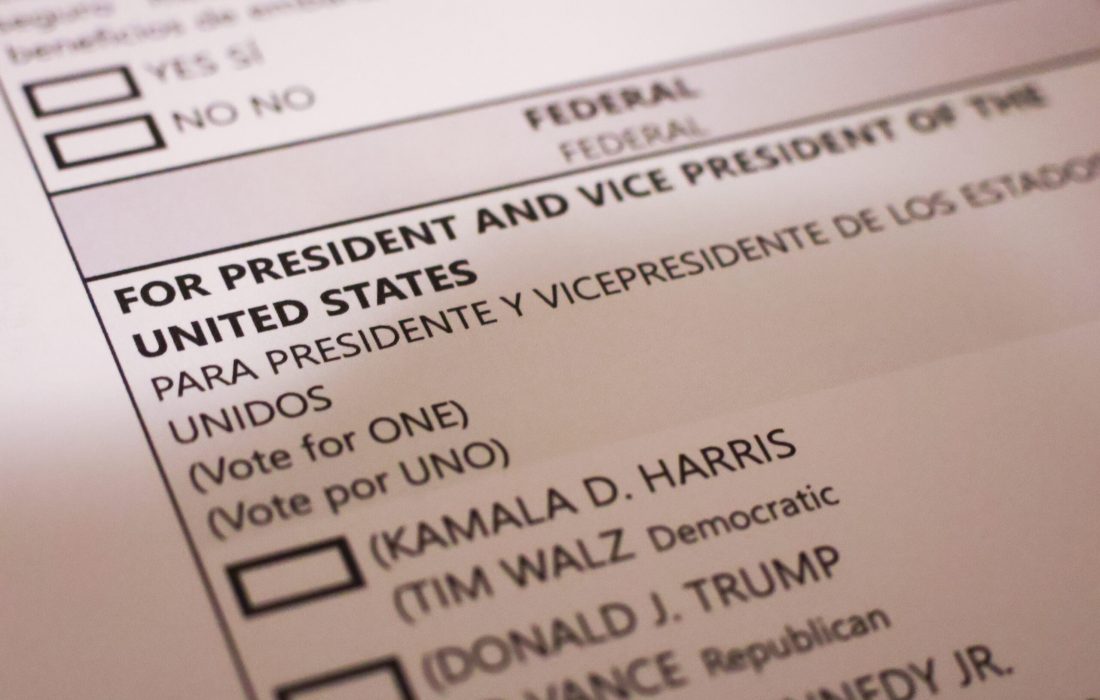Voters from swing states are part of a group with significant potential to influence the outcome of the upcoming presidential election, according to political analysts cited by the Associated Press. A swing state is one where Electoral College votes can be won by either the Democratic or Republican candidate by a small margin, according to …
Students from Swing States Reflect on the 2024 Election
Voters from swing states are part of a group with significant potential to influence the outcome of the upcoming presidential election, according to political analysts cited by the Associated Press.
A swing state is one where Electoral College votes can be won by either the Democratic or Republican candidate by a small margin, according to the U.S. Vote Foundation. In a close presidential race, the importance of these states becomes more critical.
The current first-year class represents 47 different states, according to Loyola’s Undergraduate Admissions Page.
Nearby Midwest states like Pennsylvania, Michigan and Wisconsin are part of what is sometimes labeled the “Blue Wall,” each is a key swing state in this election.These states narrowly backed Trump in the 2016 election but were won by Biden in 2020, The AP reported.
Third-year anthropology major Andy Breslin, who is from Pennsylvania, said they voted two years prior in a non-presidential election but didn’t initially plan to vote in this presidential election. However, Breslin said their parents stressed the importance of Pennsylvania’s role in the presidential election and convinced them to vote.
“There’s a big disconnect between wealthy, educated urban voters and more rural communities,” Breslin said. “Philadelphia and Pittsburgh are the biggest population centers and will likely vote blue, but usually most other counties in the middle of the state are red”
Breslin said they found Pennsylvania’s absentee voting process straightforward.
“It was pretty easy to register,” Breslin said. “All I had to do was fill in some forms and send them to my county office.”
The voting process varies from state to state, affecting the absentee voting experience differently.
Third-year psychology and anthropology student Julia Armstrong, who has previously phonebanked for local politicians, said she needed a witness to submit her absentee ballot in Wisconsin.
“I had my roommate watch me vote, sign my ballot and then I tracked it until it got delivered,” Armstrong said.
Armstrong described the process as easy but said she was caught off-guard by the language in the Wisconsin Citizenship Voting Requirement Amendment, which would change the language to specify only U.S. citizens can vote rather than stating every citizen can vote.
“I had to read it a couple of times,” Armstrong said. “They use double negatives and tricky wording to sway people one way or another.”
Armstrong said misunderstandings due to unclear language are concerning, potentially affecting critical decisions this election season. She said it’s important for young people to carefully read their ballots to avoid any mistakes.
“I honestly think this will be the most important time I’ll ever vote,” Armstrong said. “We are quite literally deciding the future we’re going into after graduation.”
Armstrong’s phone banking focused on reaching undecided voters in rural and suburban Wisconsin, where the dairy industry attracts many farmers and immigrants. She said she values connecting with her community where political discourse is becoming more unfiltered.
“To think that we’re now such a big swing state and a crucial part of an election is cool,” Armstrong said. “It feels like the tide is turning in my generation.”
Paige Goetzenberger, a third-year economics major, said she found voting fun and nerve-wracking, partly due to the heightened stakes of both national elections and those in her native Arizona. She said it took her hours to fill out her ballot due to the many referendums.
“I had to do my research,” Goetzenberger said. “I spent much time looking up the different propositions, reading through the documents themselves and researching all of the politicians that were also on the ballot.”
The Arizona ballot included 13 propositions, the most ballot referendums among the 7 swing states. Proposition 139 aimed to guarantee abortion rights in the state constitution, which Goetzenberger said highlights abortion’s prominence as an issue since the overturning of Roe v. Wade.
“It was a really big question in Arizona whether we would revert back to this policy,” Goetzenberger said. “Planned Parenthoods didn’t know what they could do and what they couldn’t do, so they were effectively not in operation for a while.”
According to Goetzenberger, Arizona’s political landscape is often divisive, with rural and urban populations holding distinct views. However, she also said she sees a growing diversity in local politics, including more representation of marginalized groups.
“One thing that I’ve noticed is an increase in diversity, as far as who is running for local positions, which I think has a big effect,” Goetzenberger said. “Hopefully marginalized groups are feeling more represented in government and I hope that continues to be a trend in the future.”
Second-year forensics major, Brenna Utrup from Twinsburg, Ohio, described an easy voting process. She registered online, received her ballot at the Loyola mailroom, followed the instructions to fill it out and mailed it back to her county.
While Ohio has been notable for its swing state status for more than a century, the state lost this status after casting its electoral votes for former President Donald Trump in the 2020 election, AP reported. Up until 2020, the state voted for every winning presidential candidate throughout its participation in the election, and has produced more U.S. presidents than any other state.
Utrup said this shift in Ohio’s voting status impacted her outlook on voting.
“When Ohio was considered a swing state, I felt there was more hope for my vote to make a difference,” Utrup said. “I was honestly the first in my dorm to vote this year because it turned into a red state.”
Gretchen Rojewski, who worked as a poll worker in Michigan during high school, said she thinks Michigan’s swing state status largely stems from the influence of auto workers and the auto industry, which many politicians prioritize in their campaigns.
Growing up in a swing state, Rojewski said she hears so much from all sides of the political spectrum it’s difficult for the election to come down to two vastly different people.
“I don’t want to be on a soapbox saying I hate the two-party system,” Rojewski said. “But I think it’s difficult to try to kind of sum up all of my opinions and feelings and beliefs and things into one candidate.”
Goetzenberger said she’s concerned about a messy post-election environment, regardless of the outcome. Utrup and Armstrong echoed these feelings and emphasized the importance of young people voting, as it brings awareness to vital local issues for people who are out of state.











